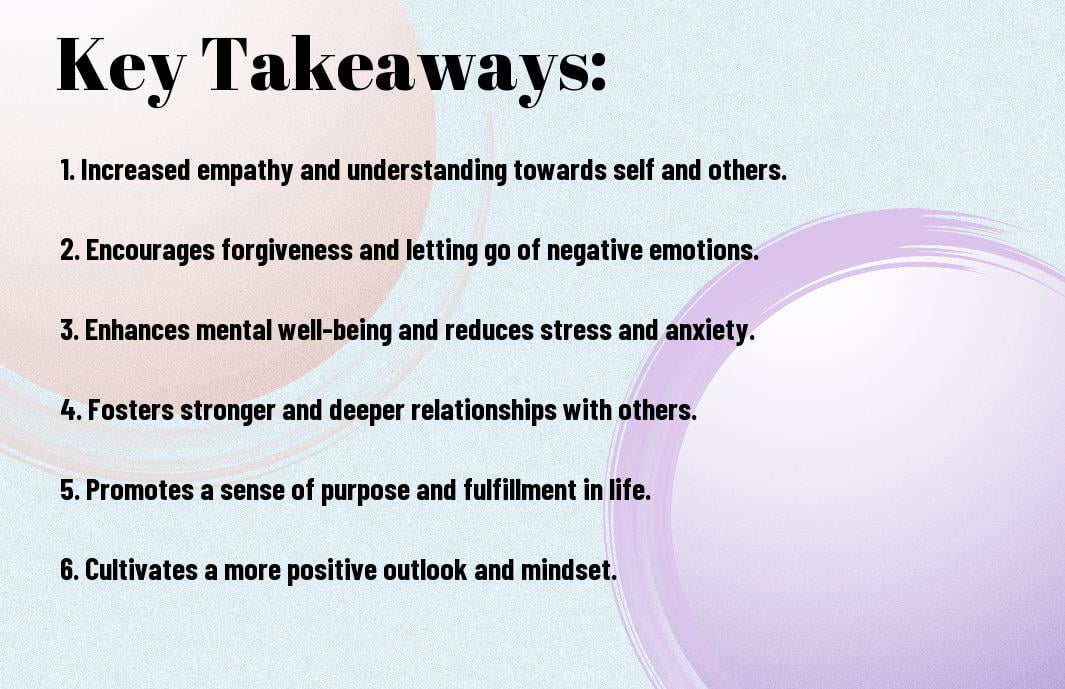It’s a common misconception that compassion is solely about helping others, but in reality, cultivating compassion has significant benefits for personal growth as well. By practicing empathy and understanding towards ourselves and others, we can increase emotional intelligence, build stronger relationships, and enhance overall well-being. This blog post explores the profound ways in which embodying compassion can transform not only our interactions with the world but also our inner selves.
Key Takeaways:
- Developing compassion towards oneself and others can lead to personal growth by fostering greater emotional intelligence and enhancing well-being.
- Practicing empathy and understanding different perspectives can help cultivate compassion, leading to improved relationships and a more positive outlook on life.
- Engaging in acts of kindness and showing empathy towards others can not only boost one’s self-esteem but also create a ripple effect of positivity in the world.

Understanding Compassion
Definition and Key Aspects
Aspects of compassion encompass empathy, understanding, and a genuine desire to alleviate the suffering of others. It involves recognizing the emotions of others and being responsive to their needs with kindness and support.
The Neurological Basis of Compassion
The neurological basis of compassion lies in the activation of areas in the brain associated with empathy, such as the prefrontal cortex and insula. When we feel compassion, our brain releases oxytocin, also known as the ‘love hormone’, which promotes bonding and social connection.
Neurological studies have shown that practicing compassion through activities like loving-kindness meditation can actually change the structure of the brain, increasing grey matter in regions linked to empathy and emotional regulation.
Compassion and Emotional Well-being
The Impact on Stress and Anxiety
Even in the most stressful and anxious situations, cultivating compassion can have a profound impact on one’s emotional well-being. With each act of kindness and understanding towards oneself and others, levels of stress and anxiety can significantly decrease. This practice allows individuals to approach challenges with a more balanced and calm perspective, leading to enhanced emotional resilience.
Boosting Happiness and Contentment
To cultivate compassion is to Compassion engage with feelings of empathy and kindness towards oneself and others. To make a conscious effort to show compassion can result in a profound sense of happiness and contentment. Research has shown that acts of compassion trigger the release of oxytocin, known as the “love hormone,” which promotes feelings of trust, bonding, and overall well-being.
Building Better Relationships Through Compassion
Enhancing Empathy and Understanding
Keep in mind that cultivating compassion can help in enhancing empathy and understanding in your relationships. By practicing compassion, you are better able to put yourself in others’ shoes and see situations from their perspective. This can lead to deeper connections and more meaningful interactions.
Conflict Resolution and Lasting Bonds
Enhancing conflict resolution skills and fostering lasting bonds are vital aspects of building better relationships through compassion. By approaching conflicts with a compassionate mindset, individuals are more likely to find peaceful resolutions and create stronger bonds with others, based on mutual respect and understanding.
For instance, when faced with a disagreement, showing empathy and compassion towards the other person’s feelings can de-escalate the situation and pave the way for a more constructive dialogue. This approach can lead to positive outcomes and strengthen the relationship in the long run.
Compassion as a Tool for Personal Development
Despite Crises can offer opportunities for personal growth and cultivating compassion, many may not realize the significant role compassion plays in personal development. It serves as a powerful tool that can lead to profound self-discovery and growth.
Self-compassion and Self-growth
Any individual seeking personal development must first practice self-compassion. By treating oneself with kindness and understanding, one can overcome challenges, learn from mistakes, and ultimately grow into a stronger, more resilient individual.
Expanding Awareness and Global Understanding
Awareness of others’ struggles and a desire for global understanding are key components of personal growth. Compassion expands our perspectives and connects us to the world around us, fostering empathy and emotional intelligence that are crucial for personal development.

Summing up
Upon reflecting on the impact of cultivating compassion on personal growth, it is clear that developing a compassionate mindset can lead to profound changes in our lives. By practicing empathy, kindness, and understanding towards ourselves and others, we not only enhance our relationships and well-being but also foster our own emotional intelligence and resilience. Embracing compassion as a guiding principle can ultimately expand our capacity for personal growth and contribute to a more harmonious and fulfilling life.
FAQ
Q: Why is cultivating compassion important for personal growth?
A: Cultivating compassion allows individuals to develop empathy, understanding, and kindness towards themselves and others. This helps in fostering healthier relationships, increasing emotional intelligence, and promoting personal well-being.
Q: How can practicing compassion improve self-awareness?
A: By practicing compassion, individuals become more attuned to their own emotions, reactions, and thought patterns. This heightened self-awareness enables them to recognize areas in their lives that need growth and improvement, leading to personal development.
Q: In what ways can cultivating compassion benefit mental health?
A: Cultivating compassion can reduce stress, anxiety, and depression by promoting feelings of inner peace, gratitude, and positivity. It also helps in building resilience, coping skills, and a more balanced perspective on life’s challenges, ultimately leading to improved mental health.




